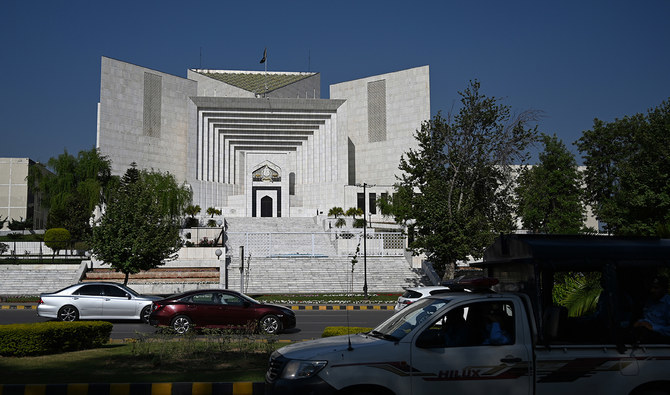ISLAMABAD: Pakistani legal experts and major political parties on Tuesday praised a Supreme Court ruling that upheld a law regulating the chief justice’s authority to independently form judicial benches and initiate suo motu proceedings on issues of public interest solely on his own.
A day earlier, a full court led by Chief Justice Qazi Faez Isa rejected all petitions challenging the Supreme Court (Practice and Procedure) Act, 2023, by a majority of 10 to five. The law was enacted in a joint session of parliament in April of this year to regulate the powers of the top judge and allow the right to appeal in fundamental rights cases under Article 184 (3) of the constitution that deals with suo motu action.
The law also envisaged a retrospective right to appeal to those aggrieved individuals against whom a judgment was issued under the said constitutional provision prior to the commencement of the act, but the court decided to strike it down.
According to the top court’s judgment, the power of taking suo motu notice in matters of public interest has been taken from the chief justice and given to a three-member committee comprising the most senior judges. Likewise, the committee has also been empowered to constitute the benches to hear appeals and petitions.
“The Supreme Court judgment is a victory for parliament, and it will also help with the smooth functioning of the top court,” advocate Adbul Moiz Jaferii told Arab News, calling the decision a “positive step in the right direction.”
“Now, three judges will decide how to constitute a bench instead of only the chief justice, and this is the essence of the law,” he continued.
Pakistan’s former attorney-general Ashtar Ausaf said the law would fix several problems the Supreme Court faced in the past, which included the pendency of several thousand cases.
“The law has ensured due process and fair procedure as per the constitution, and it is good that the Supreme Court has upheld it,” he told Arab News.
Ausaf said the country’s top judge had “authoritarian powers” in the past that had been accumulated through a judicial ruling and had now been annulled by the legislation.
“The era of ‘my court, my choice’ is over now,” he said, adding the chief justice was only the administrative head of the court since he had no authority to influence a judgment, promote or demote a judge.
“The right to appeal is granted to litigants and applicants as per universal declaration of human rights which would help address genuine public grievances,” he continued.
Justice (retired) Nasira Iqbal also lauded the ruling, saying: “We welcome this curtailment of the chief justice’s powers as this judgment also accepts parliament’s authority to enact laws.”
“There is a principle that every law takes effect prospectively,” she added. “All the past judgments of the Supreme Court are deemed as past and closed transactions.”
Major political parties including Pakistan Tehreek-e-Insaf (PTI) and Pakistan Muslim League-Nawaz (PML-N) also welcomed the judgement, though with certain reservations.
This is despite the fact that former prime minister Imran Khan’s PTI party had challenged the law, saying the Supreme Court rules could only be altered through a constitutional amendment instead of a simple legislation.
Additionally, it should not take a retrospective effect.
“The court has accepted our one demand as the law will have a prospective effect while our other contention has been rejected,” PTI spokesperson and member of its legal team Advocate Shoaib Shaheen told Arab News.
“It is a good thing that litigants are granted the right to appeal in suo motu cases,” he continued.
However, he maintained it would have been better if the top court had changed the rules on its own, or if parliament had done it through constitutional amendment.
The PML-N, led by former prime minister Shehbaz Sharif, passed the legislation along with its allies in April and said it was a litigants’ right to be able to appeal the top court’s verdicts.
“The legislation and now its approval from the top judiciary has ended the one-man show in the Supreme Court,” Talal Chaudhry, the party’s joint secretary, told Arab News.
“It would have been better if the court had not decided to pick and choose [its different provisions] since the whole law was passed by parliament,” he added while referring to the stipulation related to its retrospective implementation.


















